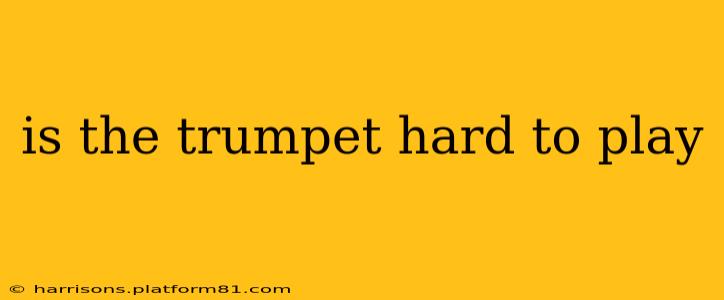Is the Trumpet Hard to Play? A Comprehensive Guide
The question of whether the trumpet is hard to play is a common one, and the answer, like most things in life, is nuanced. It's not simply a yes or no. The difficulty depends on several factors, including your musical background, natural aptitude, practice habits, and your definition of "hard."
Let's break down the challenges and rewards of learning the trumpet to give you a clearer picture.
What Makes the Trumpet Challenging?
Several aspects of trumpet playing present initial hurdles for beginners:
-
Embouchure: Developing the correct embouchure (the way you shape your mouth and use your facial muscles) is crucial. It requires precise muscle control and takes time and dedicated practice to master. This is often cited as the most difficult aspect for new players. Incorrect embouchure can lead to fatigue, poor tone, and even lip injuries.
-
Breath Control: Trumpet playing demands excellent breath control. You need to support your notes with consistent airflow, and learning to control your breathing efficiently is essential for both tone quality and endurance.
-
Valve Coordination: Coordinating your fingers to press the valves correctly and smoothly is crucial for playing accurate notes and melodies. This requires dexterity and practice.
-
Range and Tone Production: Producing a clear, resonant tone across the trumpet's full range requires consistent effort and fine-tuning of your embouchure, breathing, and air support. Developing a beautiful tone takes patience and persistent practice.
-
Maintaining Consistent Practice: Like any instrument, consistent practice is vital for improvement. Regular, focused sessions are key to developing muscle memory and improving technique.
What Makes the Trumpet Rewarding?
Despite the initial challenges, the trumpet offers numerous rewards for dedicated players:
-
Versatile Instrument: The trumpet is used in a wide variety of musical genres, from classical music and jazz to pop and rock. This versatility allows for exploration of many musical styles.
-
Expressive Instrument: The trumpet's bright tone and expressive capabilities allow players to convey a wide range of emotions and nuances in their playing.
-
Social Aspects: Playing in bands or ensembles provides opportunities for social interaction and collaboration with other musicians.
-
Sense of Accomplishment: Mastering the trumpet, with its technical demands, offers a profound sense of accomplishment and personal growth.
How Long Does It Take to Learn to Play the Trumpet?
The time it takes to learn to play the trumpet varies greatly from person to person. Some individuals might show quicker progress than others, but consistent practice is the most significant factor. You can expect to see noticeable progress within a few months of consistent practice, but mastering the instrument takes years of dedicated effort.
Is the Trumpet Harder Than Other Instruments?
Compared to other instruments, the trumpet's difficulty is relative. Some may find it easier than instruments like the violin or piano, while others might find it more challenging. It all depends on individual aptitude, learning styles, and dedication to practice.
What Age Is Best to Start Learning the Trumpet?
There's no single "best" age to start learning the trumpet. Many begin as young children, benefiting from developing their embouchure and musical skills early. However, adults can also learn and enjoy playing the trumpet, although they might need to dedicate more time to practice.
Can I Teach Myself to Play the Trumpet?
While you can find numerous resources online to help you learn, self-teaching the trumpet presents significant challenges. A qualified instructor can provide personalized feedback, correct bad habits early, and guide you through the learning process more effectively. A teacher can significantly speed up your learning and improve your technique.
In conclusion, while the trumpet presents challenges, particularly in mastering the embouchure and breath control, its rewarding nature and versatility make it a fulfilling instrument to learn. With dedication, practice, and potentially the guidance of a good teacher, anyone can enjoy playing the trumpet.
